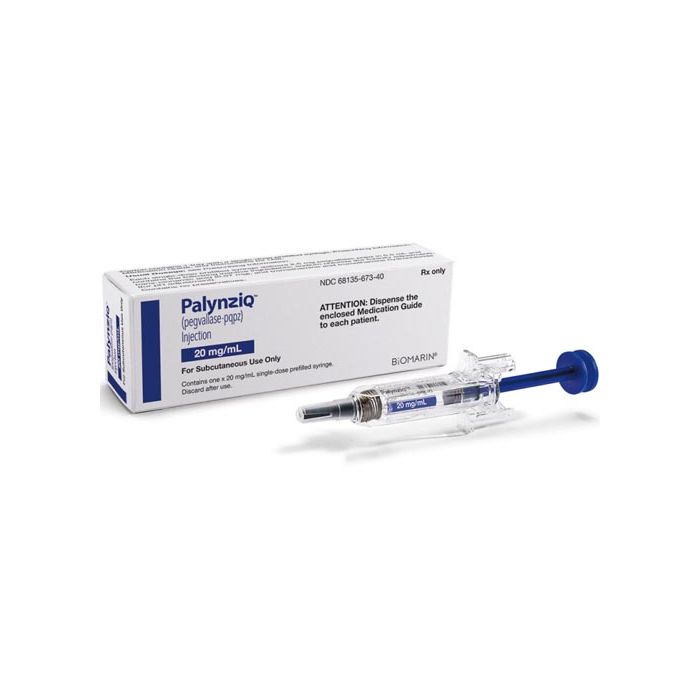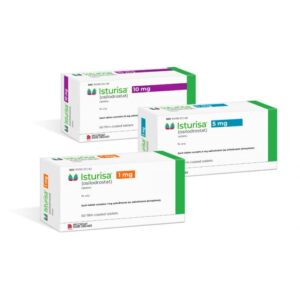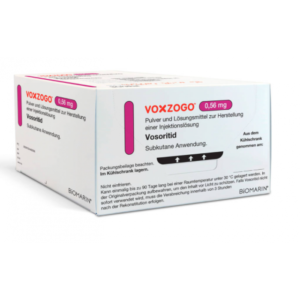Palynziq (pegvaliase-pqpz) for sale – Buy Palynziq (pegvaliase-pqpz) online
What is Palynziq (pegvaliase-pqpz) for?
Palynziq (pegvaliase-pqpz) is a PEGylated phenylalanine ammonia lyase (PAL) enzyme indicated for the treatment of phenylketonuria (PKU) in adults and adolescents from 16 years of age and who have uncontrolled blood phenylalanine concentrations greater than 600 micromol/L on existing management. It is available in single-dose prefilled syringe form each containing 2.5 mg/0.5 mL, 10 mg/0.5 mL and 20 mg/1 mL of pegvaliase-pqpz[1].
How does Palynziq (pegvaliase-pqpz) work?
Palynziq (pegvaliase-pqpz) converts phenylalanine to ammonia and trans-cinnamic acid.
It substitutes for the deficient phenylalanine hydroxylase (PAH) enzyme activity in patients with PKU and reduces blood phenylalanine concentrations[1].
Where has Palynziq (pegvaliase-pqpz) been approved?
Palynziq (pegvaliase-pqpz) was approved by:
- The Food and Drug Administration (FDA), USA, on May 24, 2018, for the treatment of adult patients with phenylketonuria (PKU) who have inadequate blood phenylalanine control (blood phenylalanine levels greater than 600 micromol/l) despite prior management with available treatment options[1].
- European Medicines Agency (EMA), European Union (EU), on May 03, 2019, for the treatment of patients with phenylketonuria (PKU) aged 16 years and older who have inadequate blood phenylalanine control (blood phenylalanine levels greater than 600 micromol/l) despite prior management with available treatment options[2].
Please note that this medicine may have also been approved in other regions than the ones we’ve listed. If you have a question about its approval in a specific country feel free to contact our support team.
How is Palynziq (pegvaliase-pqpz) taken?
Treatment with Palynziq (pegvaliase-pqpz) should be directed by physicians experienced in the management of phenylketonuria (PKU). The standard dosage consists of several phases and is as follows[2]:
Posology
Before initiating treatment, blood phenylalanine level must be obtained. Monitoring of blood phenylalanine level is recommended once a month.
Dietary phenylalanine intake should remain consistent until a maintenance dose is established.
Dosing regimens
Induction
The recommended starting dose of Palynziq (pegvaliase-pqpz) is 2.5 mg administered once per week for 4 weeks.
Titration
The dose should be escalated gradually based on tolerability to the daily maintenance dose required to achieve blood phenylalanine level of 120 to 600 micromol/l.
Maintenance
The maintenance dose is individualised to achieve the patient’s blood phenylalanine control (i.e., a phenylalanine level between 120 to 600 micromol/l) taking into account the patient tolerability to Palynziq (pegvaliase-pqpz) and the dietary protein intake.
Dosage may be different for special populations. Reduction in dose may be required based on symptoms and experienced side effects.
Complete information about Palynziq (pegvaliase-pqpz) dosage and administration, including a specific recommended dosing regimen table, can be found in the official prescribing information listed in our references section[1].
Note: Please consult with your treating doctor for personalised dosing and potential drug interactions.
Are there any known side effects or adverse reactions of Palynziq (pegvaliase-pqpz)?
Common adverse reactions[1]
The most common adverse reactions listed in the prescribing information include:
- injection site reactions
- arthralgia
- hypersensitivity reactions
- headache
- generalized skin reactions lasting at least 14 days
- pruritus
- nausea.
Serious adverse reactions[1]
The most common adverse reactions listed in the prescribing information include:
- anaphylaxis
- other hypersensitivity reactions.
Use in specific populations
Limited available data with Palynziq (pegvaliase-pqpz) use in pregnant women are insufficient to inform a drug-associated risk of adverse developmental outcomes. However, there are risks to the fetus associated with poorly controlled phenylalanine concentrations in women with PKU during pregnancy including increased risk for miscarriage, major birth defects (including microcephaly, major cardiac malformations), intrauterine fetal growth retardation, and future intellectual disability with low IQ; therefore, phenylalanine concentrations should be closely monitored in women with PKU during pregnancy[1].
The safety and efficacy of Palynziq (pegvaliase-pqpz) in paediatric patients from birth to less than 16 years have not been established. Available data on patients aged 16 to 18 years are described in the official prescribing information. Clinical studies of Palynziq (pegvaliase-pqpz) did not include patients aged 65 years and older.
For a comprehensive list of side effects and adverse reactions please refer to the official prescribing information[1,2].
References
- Full prescribing information [FDA]: Palynziq (pegvaliase-pqpz)[PDF], BioMarin Pharmaceutical Inc., May. 2018.
- Summary of product characteristics [EMA]: Palynziq (pegvaliase-pqpz)[PDF], BioMarin Pharmaceutical Inc., May. 2019.
- FDA. FDA approves a new treatment for PKU, a rare and serious genetic disease, May 24, 2018 (last update: May 24, 2018), cited on Dec 04, 2019.
- EMA.Palynziq: What benefits of Palynziq have been shown in studies?, Date unknown (last update: unknown), cited on Dec 06, 2019.
This content has been reviewed by a Medical Doctor.







Reviews
There are no reviews yet.